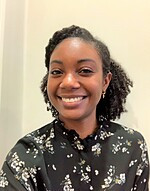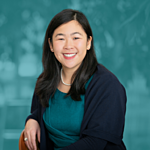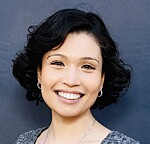Toxic chemicals are present in manufactured consumer products and result in widespread contamination of ecosystems worldwide. While human exposure is ubiquitous, there remains enduring inequities in exposure evidenced by national biomonitoring studies. Pursuing environmental justice by reducing exposures to toxic chemicals and mitigating their harmful health effects requires multi-sector collaboration.
This webinar brought together senior fellows of the Agents of Change in Environmental Justice program: Michelle Gin, Annie Hoang, and Theresa Guillette. The webinar was moderated by Max Aung and Lariah Edwards. Importantly, each of the webinar guests and moderators represent unique perspectives in research, practice, and policy at the intersection of toxic chemicals, health, and environmental justice. The invited fellows drew from their own work and experiences to discuss ongoing challenges and opportunities at this intersection. Collectively, this group of speakers and moderators have experience in and represent academia, non-profit, government, and clinical settings. Join us for this exciting webinar and engage with our speakers.
The face of science is changing. Increased diversity within the world of environmental health research is spurring the innovative ideas and solutions to push our planet forward in a healthy, more just direction.
The George Washington University Milken Institute School of Public Health has partnered with Environmental Health News to provide a space for the environmental health leaders of tomorrow to explore the intersection of research, health, diversity and justice.
"Agents of Change" is an ongoing series featuring the stories, analyses and perspectives of next generation environmental health leaders who come from historically under-represented backgrounds in science and academia. To learn more about the project, read the blogs, or apply for the fellowship go to https://agentsofchangeinej.org/.
Featured Speakers
 Max Aung, PhD, is an Assistant Professor in the Division of Environmental Health at the University of Southern California Keck School of Medicine. Max is an alumnus of the Agents of Change in Environmental Justice Fellowship as well as the RWJF Health Policy Research Scholars Fellowship. Max’s research focuses on applying data science frameworks to understand potential mechanisms linking chemical mixtures to health across the life course. Max also draws on his background as an immigrant and firstgen graduate to leverage research and policy frameworks to reduce environmental health disparities among historically marginalized communities.
Max Aung, PhD, is an Assistant Professor in the Division of Environmental Health at the University of Southern California Keck School of Medicine. Max is an alumnus of the Agents of Change in Environmental Justice Fellowship as well as the RWJF Health Policy Research Scholars Fellowship. Max’s research focuses on applying data science frameworks to understand potential mechanisms linking chemical mixtures to health across the life course. Max also draws on his background as an immigrant and firstgen graduate to leverage research and policy frameworks to reduce environmental health disparities among historically marginalized communities.
 Lariah Edwards, PhD, is an environmental health scientist with years of experience critically evaluating toxicological and epidemiological data for the purpose of understanding health effects associated with exposure to environmental chemicals. Currently, Edwards is as postdoctoral scientist working jointly at the George Washington (GW) School of Public Health and the Environmental Defense Fund (EDF). At GW, Edwards is working with Dr. Ami Zota in the Environmental and Occupational Health Department where her research focuses on exposure and hazard considerations of chemicals found in food and beauty products. At EDF, Edwards works with Dr. Jennifer McPartland where she supports scientific advocacy efforts related to the evaluation of chemicals under the Toxic Substances Control Act. Edwards earned her doctorate in Environmental Health from Boston University School of Public Health in 2019 and her bachelor of science in Chemistry from North Carolina Agricultural and Technical State University. In addition to her postdoctoral work, Edwards was also a Spring 2021 Agents of Change in Environmental Justice Fellow.
Lariah Edwards, PhD, is an environmental health scientist with years of experience critically evaluating toxicological and epidemiological data for the purpose of understanding health effects associated with exposure to environmental chemicals. Currently, Edwards is as postdoctoral scientist working jointly at the George Washington (GW) School of Public Health and the Environmental Defense Fund (EDF). At GW, Edwards is working with Dr. Ami Zota in the Environmental and Occupational Health Department where her research focuses on exposure and hazard considerations of chemicals found in food and beauty products. At EDF, Edwards works with Dr. Jennifer McPartland where she supports scientific advocacy efforts related to the evaluation of chemicals under the Toxic Substances Control Act. Edwards earned her doctorate in Environmental Health from Boston University School of Public Health in 2019 and her bachelor of science in Chemistry from North Carolina Agricultural and Technical State University. In addition to her postdoctoral work, Edwards was also a Spring 2021 Agents of Change in Environmental Justice Fellow.
This webinar was moderated by Max Aung, PhD, Assistant Professor in the Division of Environmental Health at the University of Southern California Keck School of Medicine, and Lariah Edwards, PhD, postdoctoral scientist working jointly at the George Washington (GW) School of Public Health and the Environmental Defense Fund (EDF).
 Michelle Gin, MPH, is an Environmental Health Supervisor for Community Outreach and Engagement in the Environmental Health Division of Ramsey County Public Health Department in Minnesota. Before this role, Michelle was a Toxic Free Kids Communications Planner in the Environmental Health Division of the Minnesota Department of Health. Her work is focused on toxic chemicals in consumer products where she educates consumers to change behaviors and influences businesses to change practices. She earned her MPH in Maternal and Child Health with focus on Public Health Policy and Health Disparities from the University of Minnesota School of Public Health. Michelle is a former Leadership Education in Adolescent Health Fellow. She is first generation with her family originating from Hong Kong. Michelle strives for positive and lasting change.
Michelle Gin, MPH, is an Environmental Health Supervisor for Community Outreach and Engagement in the Environmental Health Division of Ramsey County Public Health Department in Minnesota. Before this role, Michelle was a Toxic Free Kids Communications Planner in the Environmental Health Division of the Minnesota Department of Health. Her work is focused on toxic chemicals in consumer products where she educates consumers to change behaviors and influences businesses to change practices. She earned her MPH in Maternal and Child Health with focus on Public Health Policy and Health Disparities from the University of Minnesota School of Public Health. Michelle is a former Leadership Education in Adolescent Health Fellow. She is first generation with her family originating from Hong Kong. Michelle strives for positive and lasting change. Theresa Guillette, PhD, received her doctorate in Marine Biomedicine and Environmental Health Sciences from the Medical University of South Carolina. Her dissertation work focused on environmental contaminants and associated health effects in Nile crocodiles. Theresa is currently an Environmental Scientist II at Arcadis. Her previous research focused on using geographic information system (GIS) models to understand the extent of PFAS contamination from fluorochemical production facilities (Parkersburg, WV and Fayetteville, NC).
Theresa Guillette, PhD, received her doctorate in Marine Biomedicine and Environmental Health Sciences from the Medical University of South Carolina. Her dissertation work focused on environmental contaminants and associated health effects in Nile crocodiles. Theresa is currently an Environmental Scientist II at Arcadis. Her previous research focused on using geographic information system (GIS) models to understand the extent of PFAS contamination from fluorochemical production facilities (Parkersburg, WV and Fayetteville, NC).

 Lariah Edwards, PhD, is an environmental health scientist with years of experience critically evaluating toxicological and epidemiological data for the purpose of understanding health effects associated with exposure to environmental chemicals. Currently, Edwards is as postdoctoral scientist working jointly at the George Washington (GW) School of Public Health and the Environmental Defense Fund (EDF). At GW, Edwards is working with Dr. Ami Zota in the Environmental and Occupational Health Department where her research focuses on exposure and hazard considerations of chemicals found in food and beauty products. At EDF, Edwards works with Dr. Jennifer McPartland where she supports scientific advocacy efforts related to the evaluation of chemicals under the Toxic Substances Control Act. Edwards earned her doctorate in Environmental Health from Boston University School of Public Health in 2019 and her bachelor of science in Chemistry from North Carolina Agricultural and Technical State University. In addition to her postdoctoral work, Edwards was also a Spring 2021 Agents of Change in Environmental Justice Fellow.
Lariah Edwards, PhD, is an environmental health scientist with years of experience critically evaluating toxicological and epidemiological data for the purpose of understanding health effects associated with exposure to environmental chemicals. Currently, Edwards is as postdoctoral scientist working jointly at the George Washington (GW) School of Public Health and the Environmental Defense Fund (EDF). At GW, Edwards is working with Dr. Ami Zota in the Environmental and Occupational Health Department where her research focuses on exposure and hazard considerations of chemicals found in food and beauty products. At EDF, Edwards works with Dr. Jennifer McPartland where she supports scientific advocacy efforts related to the evaluation of chemicals under the Toxic Substances Control Act. Edwards earned her doctorate in Environmental Health from Boston University School of Public Health in 2019 and her bachelor of science in Chemistry from North Carolina Agricultural and Technical State University. In addition to her postdoctoral work, Edwards was also a Spring 2021 Agents of Change in Environmental Justice Fellow. Annie Hoang, MPH, is an an MD candidate at the University of California, San Francisco (UCSF), where she is enrolled in the Program in Medical Education for the Urban Underserved (PRIME-US). She recently received her MPH degree in health policy from Harvard T.H. Chan School of Public Health. She graduated with Distinction from Yale, where she holds a BS degree in Molecular Cellular Developmental Biology Intensive with a biotechnology concentration. Her work focuses broadly on advancing health equity in the built environment. Recent topics include dichloromethane deaths, water equity access, indoor air quality in schools, and green chemistry policy.
Annie Hoang, MPH, is an an MD candidate at the University of California, San Francisco (UCSF), where she is enrolled in the Program in Medical Education for the Urban Underserved (PRIME-US). She recently received her MPH degree in health policy from Harvard T.H. Chan School of Public Health. She graduated with Distinction from Yale, where she holds a BS degree in Molecular Cellular Developmental Biology Intensive with a biotechnology concentration. Her work focuses broadly on advancing health equity in the built environment. Recent topics include dichloromethane deaths, water equity access, indoor air quality in schools, and green chemistry policy.